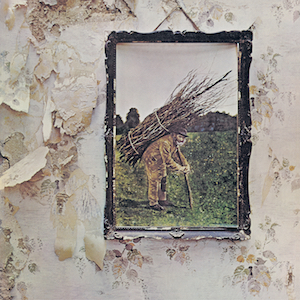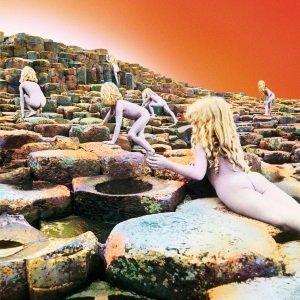This page is based on this
Wikipedia article Text is available under the
CC BY-SA 4.0 license; additional terms may apply.
Images, videos and audio are available under their respective licenses.

Led Zeppelin were an English rock band formed in London in 1968. The group consisted of guitarist Jimmy Page, singer Robert Plant, bassist/keyboardist John Paul Jones, and drummer John Bonham. Along with Black Sabbath and Deep Purple,
the band's heavy, guitar-driven sound has led them to be cited as one of the progenitors of heavy metal. Their style drew from a wide variety of influences, including blues, psychedelia, and folk music.

The untitled fourth studio album by the English rock band Led Zeppelin, commonly known as Led Zeppelin IV, was released on 8 November 1971 by Atlantic Records. It was produced by guitarist Jimmy Page and recorded between December 1970 and February 1971, mostly in the country house Headley Grange. The album contains one of the band's best known songs, "Stairway to Heaven".

Physical Graffiti is the sixth studio album by the English rock band Led Zeppelin. It was released as a double album on 24 February 1975 by the group's new record label, Swan Song Records.

"Misty Mountain Hop" is a song from English rock band Led Zeppelin's untitled fourth album, released in 1971. In the United States and Australia it was the B-side of the "Black Dog" single, but still received considerable FM radio airplay. It was recorded at Headley Grange, a mansion with a recording studio in Hampshire, England, where the band sometimes lived.

"Black Dog" is a song by English rock band Led Zeppelin, the opening track on their fourth album (1971). It was released as a single in the United States and in Australia with "Misty Mountain Hop" as the B-side, reaching number 15 on the Billboard Hot 100 and number 10 in Australia.
"The Song Remains the Same" is a song by the English rock group Led Zeppelin. It is the opening track from their 1973 album, Houses of the Holy.
"No Quarter" is a song by Led Zeppelin that appears on their 1973 album Houses of the Holy. It was written by John Paul Jones, Jimmy Page and Robert Plant. The song became a centerpiece at all Led Zeppelin concerts thereafter, until their final tour. It appears in both the film versions and both live album versions of The Song Remains the Same released in 1976 and expanded in 2007. It appeared once more in 1994 on Page and Plant's reunion album as the title track. It also appears on Led Zeppelin's 2012 live album Celebration Day, which documented their 2007 reunion performance at the O2 Arena in London. It was re-released in the deluxe edition of Houses of the Holy.
"The Rover" is a song by English rock band Led Zeppelin written by guitarist Jimmy Page and singer Robert Plant. Although mostly recorded years earlier, it was released on the group's 1975 double album, Physical Graffiti.
"The Ocean" is a song by English rock band Led Zeppelin, from their 1973 album Houses of the Holy. The ocean is a metaphor for the "sea of heads" faced by lead singer Robert Plant "in the auditoriums", according to the group's biographer Dave Lewis.
"The Rain Song" is a song by English rock band Led Zeppelin, and the second track from their fifth album Houses of the Holy, released in 1973.

"D'yer Mak'er" is a song by the English rock band Led Zeppelin, from their 1973 album Houses of the Holy. The title is a play on the word "Jamaica" when spoken in an English accent.

"Dancing Days" is a song by English rock band Led Zeppelin. It appears on their 1973 album, Houses of the Holy, and was released as a single in the US. It was recorded at Stargroves, England in 1972. It was inspired by an Indian tune that Jimmy Page and Robert Plant heard while traveling in Bombay. This was the first track from the album to be offered for radio play by Atlantic Records. It was premiered on 24 March 1973 on the BBC Radio One Rosko lunch time show.

"The Crunge" is a song by the English rock band Led Zeppelin from their 1973 album Houses of the Holy. It was also released as the B-side of "D'yer Mak'er" in the US.

Led Zeppelin's 1972 Japanese Tour was the second and final concert tour of Japan by the English rock band. The tour commenced on 2 October and concluded on 10 October 1972.

"Over the Hills and Far Away" is the third track from English rock band Led Zeppelin's 1973 album Houses of the Holy. It was released as a single, with "Dancing Days" as the B-side, in the US.

Bron-Yr-Aur is a privately owned 18th-century cottage, on the outskirts of Machynlleth, Wales, best known for its association with the English rock band Led Zeppelin. In 1970, both Jimmy Page and Robert Plant went there, and wrote many of the tracks that appeared on the band's third and fourth studio albums, including Immigrant Song and Stairway to Heaven.
The Led Zeppelin Deluxe Edition is a series of albums reissued by English rock group Led Zeppelin, distributed by Atlantic Records. It contains all nine of the original Led Zeppelin studio albums remastered from the original analog tapes. Along with the remastered albums, there is a companion disc with each album, consisting of previously unreleased audio tracks and alternate mixes of released tracks. Many of these are described as work-in-progress or alternate mixes made during the original production rather than new remixes generated to highlight discarded recording elements. The first companion album consists of the 10 October 1969 concert in Paris. The albums were released in chronological order, each with inverted album covers.








